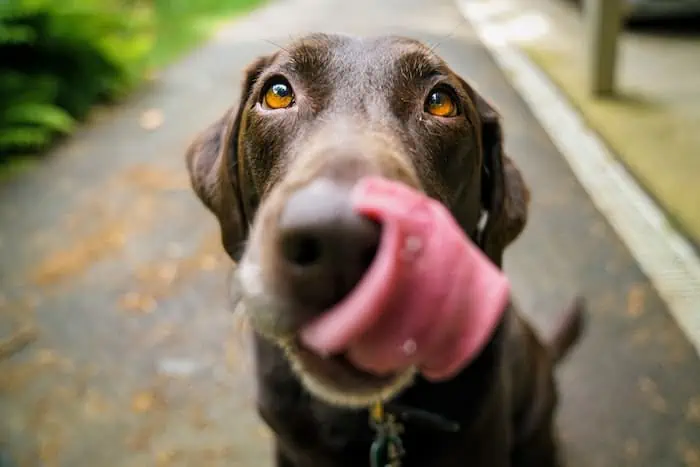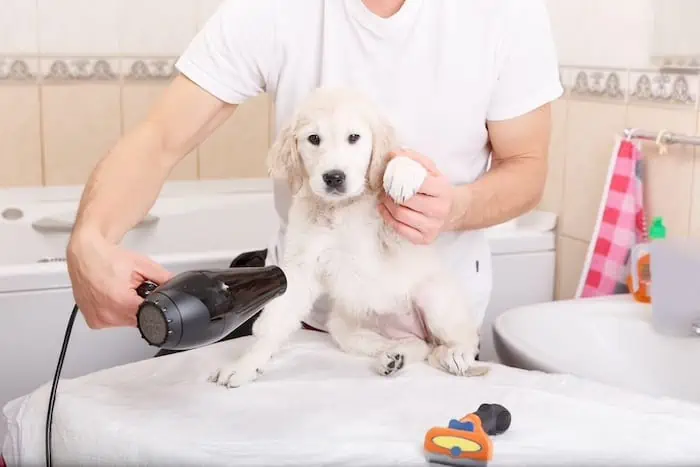4 Reasons Why Dogs Lick When You Blow in Their Face
If you have ever blown on your dog’s—or even your cat’s—nose, it is quite possible that you have witnessed an unfavorable reaction from your furry buddy. It may be in the form of avoidance or them licking their own face, but why exactly does that happen? Why do dogs lick when you blow in their face?
When you blow in a pup’s face, it quickly dries up the soft moist surface of their nose, initiating the licking reflex to remoisturize the area. A couple of other reasons for dogs to lick their nose after a blow includes them being surprised (since they’re incapable of blowing air from their lips like we humans do) as well as licking to encourage some distance between the two of you because they simply don’t like the sensation of the burst of air.
Dogs naturally really hate having air blown on their faces. Let’s discuss why exactly they hate this sensation so much and what you can do to keep them happy and engaged.
What makes dogs so averse to having air blown on them?
Many humans and other animals aren’t too happy when someone blows in their faces, and the same goes for dogs. The following four reasons are why dogs dislike having air blown into their faces and why they may be licking afterward.
1. Dogs may mistakenly perceive a blow to the face as an aggressive gesture.
While you may think it’s hilarious to blow in your dog’s face, they probably won’t find it humorous at all, and it may even cause some dogs to get furious and aggressive.
The fact that blowing in a dog’s face may be mistaken for an act of violence is one of the reasons why canines despise having this done to them. The reason for this is that before engaging in combat, dogs will frequently expel air from their cheeks and blast air out of their noses.
It’s possible that you’ve seen this before. When two dogs meet for the first time, it’s common for them to give each other a “play bow” in front of the other. On the other hand, when things aren’t as fun and friendly, dogs might first go nose to nose with each other while blowing small bursts of air out of their nostrils and huffing at each other.
Even if you are aware that you are only doing it in jest, your pup has no idea whether or not getting blown on is just something that might lead to a much more serious predicament.
2. It’s something that can provoke a hostile response from them.
Your dog will be startled and surprised if you blow in their face. The vast majority of dogs anticipate that when a human approaches them, it will be for a positive reason, such as to give them a treat, give them a pat on the back, call them a good boy or girl, or possibly be a prelude to an enjoyable walk.
A dog will be caught off guard by the abrupt blast of air that comes from a person as it blows up their nose and into their face. Their senses are affected in a way that is really unsettling as a result of it.
Dogs’ senses are far more advanced than humans; the nostrils, eyes, and ears are all extremely sensitive, which means that a small blow to the face has a significantly greater impact on them than it would have on a person… Would you find it enjoyable if someone did it to you suddenly?
When this occurs, the majority of dogs will respond in their natural intuitive manner to being blown on by withdrawing their bodies or turning away in surprise. It’s also possible to catch a glimpse of them doing what looks like a brief lick of the air. This reflex motion is quite similar to how we blink in response to someone blowing in our eyes when we are scared. Licking is a common anxiety behavior in many dogs.
Due to getting startled or a dog perceiving this gesture as a challenge or threat (as mentioned above), it can easily trigger a dog to have a negative and potentially problematic response. With that being said, you should certainly not be trying to provoke or scare your dog in any way.
3. Dogs pick up a lot of information from your breath.

Just as dogs like to sniff the air (as well as each other’s bottoms), they do this to pick up more information about the world around them. Although a blow in the face may be startling or provoke an undesirable response, some pup’s may lick afterward to try to snatch up any additional information they can from the air you just blew at them.
It makes perfect sense when you take into account the fact that a dog’s nose has 300 million olfactory receptors. It is because of this that they have such an incredible sense of smell, one that is almost ten thousand times more accurate than our own.
4. Dogs don’t find it comfortable when you get too near to them and face to face.
When you decide to blow in a dog’s face, this also means that you need to be incredibly close to them, directly in their face and violating their personal space. It is not uncommon for a dog to respond to this action by snarling, snapping, howling, or even attacking the person who is blowing on them if they are already sensitive about not feeling cornered or having their space invaded.
Dogs can find it unsettling and uncomfortable when humans get too close to their faces, which is one of the reasons many of them don’t enjoy it when people pet them. Many dogs have developed the ability to withstand that, and some are perfectly fine with it because they grew up in an affectionate environment, but when you add on top of a dog that already has aversions to such the fact that they are being blown on, it may be too much for that dog to handle and be far outside of his or her comfort zone.
Related Reading: Do Dogs Have Butt Cheeks? (A Detailed Explanation)
FAQs
Is it painful for a dog if you blow in its face?
A dog will not be harmed if you blow in its face, excluding those who may have significant health problems involving their faces. It is quite improbable that it would be painful to the average dog though, but it is quite possible that they will find it uncomfortable and unpleasant. It has a significant influence on their sense of smell as well as their vision and hearing.
Canines are known to have an incredible sense of smell, which is said to be hundreds of times greater than what is possible for humans. You are likely aware of this due to the work that our canine friends conduct for the police as detection dogs.
Therefore, when you blow into their noses, they are immediately hit with a powerful blast of your fragrance, and that may be somewhat overwhelming for them.
If you’ve ever had a speck of dust or some other foreign object land in your eye, you’ll know that it makes you reflexively blink and pull away from that object. Even though you knew what was happening, it was still a bothersome experience even if it didn’t hurt.
It’s no wonder that our canine companions, who may or may not be caught by surprise when someone blows on their face, may inform us in very emphatic words that they genuinely do not enjoy it!
Can you blow-dry a pup?

A hairdryer may have the same effect on a dog as being blown on, which can make them try to get away from the source of the noise.
If your furry buddy has a coat that needs frequent professional maintenance, there is a reasonable probability that they have gotten used to the warm moist air drying them off during their trips to the groomer. This is especially true if your dog has a coat that requires regular professional attention.
If this is not the case, however, and you find yourself with a drenched dog after taking it for a walk in the rain, you may discover that they are not too enthusiastic about the prospect of having their fur blown dry. It’s simply very overstimulating and unpleasant. However, blow-drying a dog is a very normal part of caring for your pup as they certainly should not be left with a wet coat all day.
Is it typical for dogs to lie there and lick the air?
When dogs lick at the air, we may not instantly comprehend what they are trying to communicate with us, but this behavior is entirely natural in most cases.
Dogs lick the air for various reasons, including to calm themselves when they are anxious, soothe an upset stomach, and improve their ability to sniff things that interest them. There is no need for concern if your dog just engages in occasional, fleeting bouts of air-licking. Nevertheless, you should keep a close eye out for any increases in the amount of time or frequency your dog spends licking since this may indicated a behavioral or compulsive condition manifesting.
See Also:
5 Reasons Why Dogs Lick their Collars
9 Reasons Why Dogs Lick Their Lips When You Pet Them
Why Does My Dog Lick My Face Before Bed? (6 Reasons)
Why Does My Dog Lick the Floor After Eating? (7 Reasons)

Family Dog Expert Author
Hi there! I’m Stuart, a devoted dog lover and family dog expert with over a decade of experience working with our furry companions. My passion for dogs drives me to share my knowledge and expertise, helping families build strong, loving bonds with their four-legged friends. When I’m not writing for SirDoggie, you’ll find me hiking, playing with my beautiful dog, or studying music.